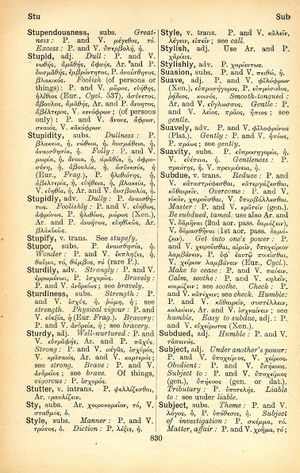subject: Difference between revisions
Ὡς χαρίεν ἔστ' ἄνθρωπος, ἂν ἄνθρωπος ᾖ → Res est homo peramoena, quum vere est homo → Wie voller Anmut ist ein Mensch, der wirklich Mensch
(Woodhouse 5) |
(CSV5) |
||
| Line 1: | Line 1: | ||
{{ | {{Woodhouse1 | ||
| | |Text=[[File:woodhouse_830.jpg|thumb|link={{filepath:woodhouse_830.jpg}}]]'''adj.''' | ||
<b class="b2">Under another's power</b>: P. and V. [[ὑποχείριος]], V. [[χείριος]]. | |||
<b class="b2">Obedient</b>: P. and V. [[ὑπήκοος]]. | |||
<b class="b2">Subject to</b>: P. and V. [[ὑποχείριος]] (gen.), [[ὑπήκοος]] (gen. or dat.). | |||
<b class="b2">Tributary</b>: P. [[ὑποτελής]]. | |||
<b class="b2">Liable to</b>: see under [[liable]]. | |||
'''subs.''' | |||
<b class="b2">Theme</b>: P. and V. [[λόγος]], ὁ, P. [[ὑπόθεσις]], ἡ. | |||
<b class="b2">Subject of investigation</b>: P. [[σκέμμα]], τό. | |||
<b class="b2">Matter, affair</b>: P. and V. [[χρῆμα]], τό; see [[matter]]. | |||
<b class="b2">As opposed to predicate</b>: τὸ ὑποκείμενον (Aristotle). | |||
<b class="b2">Providing posterity with subjects for song</b>: V. ἀοιδὰς δόντες ὑστέροις βροτῶν (Eur., ''Tro.'' 1245, cf. Eur., ''Supp.'' 1225). | |||
<b class="b2">Be a subject of dispute</b>, v.; P. ἀμφισβητεῖσθαι. | |||
<b class="b2">Nothing to do with the subject</b>: P. οὐδὲν πρὸς λόγον, [[ἔξω]] τοῦ πράγματος. | |||
<b class="b2">Subject to your approval</b>: P. and V. εἰ σοὶ δοκεῖ. | |||
<b class="b2">Subjects, those governed</b>: P. and V. οἱ ὑπήκοοι, P. οἱ ἀρχόμενοι. | |||
<b class="b2">Be subjects</b>, v.: P. and V. ἄρχεσθαι. | |||
<b class="b2">Be subjects of</b>: Ar. and P. ὑπακούειν (absol. or with dat. or gen.). | |||
'''v. trans.''' | |||
<b class="b2">Bring into subjection</b>: P. and V. καταστρέφεσθαι, κατεργάζεσθαι; see [[reduce]], [[enslave]]. | |||
<b class="b2">Expose</b>: P. and V. ὑποβάλλειν (τινά τινι); see [[expose]]. | |||
<b class="b2">Be subjected to malicious accusations</b>: use Ar. and P. συκοφαντεῖσθαι. | |||
}} | }} | ||
Revision as of 10:05, 21 July 2017
English > Greek (Woodhouse)
adj.
Under another's power: P. and V. ὑποχείριος, V. χείριος.
Obedient: P. and V. ὑπήκοος.
Subject to: P. and V. ὑποχείριος (gen.), ὑπήκοος (gen. or dat.).
Tributary: P. ὑποτελής.
Liable to: see under liable.
subs.
Theme: P. and V. λόγος, ὁ, P. ὑπόθεσις, ἡ.
Subject of investigation: P. σκέμμα, τό.
Matter, affair: P. and V. χρῆμα, τό; see matter.
As opposed to predicate: τὸ ὑποκείμενον (Aristotle).
Providing posterity with subjects for song: V. ἀοιδὰς δόντες ὑστέροις βροτῶν (Eur., Tro. 1245, cf. Eur., Supp. 1225).
Be a subject of dispute, v.; P. ἀμφισβητεῖσθαι.
Nothing to do with the subject: P. οὐδὲν πρὸς λόγον, ἔξω τοῦ πράγματος.
Subject to your approval: P. and V. εἰ σοὶ δοκεῖ.
Subjects, those governed: P. and V. οἱ ὑπήκοοι, P. οἱ ἀρχόμενοι.
Be subjects, v.: P. and V. ἄρχεσθαι.
Be subjects of: Ar. and P. ὑπακούειν (absol. or with dat. or gen.).
v. trans.
Bring into subjection: P. and V. καταστρέφεσθαι, κατεργάζεσθαι; see reduce, enslave.
Expose: P. and V. ὑποβάλλειν (τινά τινι); see expose.
Be subjected to malicious accusations: use Ar. and P. συκοφαντεῖσθαι.

